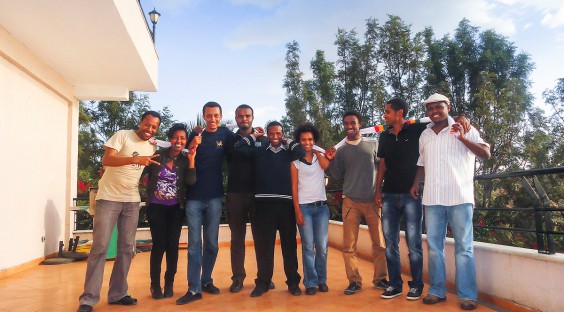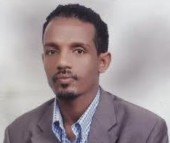Vindicated at Last, But Not Yet Entirely Free
by Chalachew Tadesse / November 18, 2015 / No comments
Editor’s note: this column was originally scheduled for publication in October 2015. Due to technical issues with our website, publication was postponed until November. There have been no updates regarding the charges against blogger Befekadu Hailu.

Founding members of Zone 9. Photo via Wikimedia.
Although the Zone 9 bloggers have been released from prison, the Ethiopian government still thinks that online dissent is terrorism.
Since April 2014, the story of Zone 9, an Ethiopian blogging collective of University-educated young professionals, has dominated headlines. Without anonymity, the collective used the motto “We blog because we care,” criticizing political repression, corruption, and social injustice using the Internet platform — hitherto the only safe fortress of dissent under the regime of the Ethiopian Peoples’ Revolutionary Democratic Front (EPRDF), a notorious predator of press freedom and dissent.

- This column’s topics will include literature, art, education, history, and political culture in Ethiopia, as well as society and politics in the Horn of Africa. Moreover, I will address the tribulations of journalists and the ill-fated constitutional right of freedom of expression under Ethiopia’s deceptive authoritarian regime. I will try to be the voice of the voiceless, be it persecuted journalists at home or exiled journalists abroad. These themes will make Ethiopia’s uniqueness and absurdities evident.

- Chalachew Tadesse is an Ethiopian journalist and columnist. He has previously worked as a full time journalist for The Reporter and The Sub-Saharan Informer English newspapers. He was also a columnist for the much-acclaimed Fact magazine, before the Ethiopian regime closed it in October 2014. A political science student by training, he works as a university lecturer and is known for his sociopolitical commentaries on the Ethiopian private press.
As an Arab Spring-style uprising is always the EPRDF’s nightmarish dream, the authorities arrested six Zone 9 bogging members — Abel Wabella, Atnaf Berhane, Mahlet Fantahun, Natnael Feleke, Zelalem Kibret, and Befekadu Hailu — in April 2014, one year before the May 2015 general elections. In fact, the regime had blocked the Zone 9 blog before arresting them. It did not matter that Zone 9 was a tiny grain of sand in a vast ocean of silence The government charged the bloggers with terrorism, invoking the infamous 2009 anti-terrorism law. With its track record of criminalizing dissent, few Ethiopians believed the government’s narrative.
Ethiopian authorities often labeled the defendants as “terrorists” repeatedly even before the formal court trial had kicked off, claiming that there was overwhelming evidence against them. Even the tone with which the authorities criminalized the bloggers proves that Ethiopian authorities are strangers to carefully worded language, at least for the sake of political correctness. Irrespective of the possible negative consequences against his integrity, the prime minister even claimed publicly to have overwhelming evidence to prove the case. Alas, official lies are always quintessential of the regime’s modus operandi.
Despite much talk about crossing what the authorities called a “red line,” I believe neither the government nor the defendants knew for certain which red lines were violated. The “red lines” the authorities refer to are ambiguous and arbitrary. So, by drawing red lines every now and then the regime rips the Constitution into pieces. In truth, the regime often crosses the red line drawn by the Constitution.
The Zone 9 trial was marred by several postponements and the total deficiency of any evidence whatsoever. Presumably, it was another one of those infamous trials that ends in utter fiasco. Throughout the long arduous court proceedings, the defendants, in no uncertain terms, maintained high spirits and a united voice, no matter how defenseless they were under the hands of ruthless investigators and prison officials.
The defendants also never stood in the court dock with fingers crossed; instead they mocked the court on many occasions, despite the risk of so-called “contempt of court.” Despite the consequences, they even slipped letters out of prison criticizing the proceedings of the sham trial and the human rights violations they encountered in the notorious Addis Ababa prison. Last November, in one of those smuggled letters, they unequivocally criticized the prime minister for labeling them ‘terrorists’ publicly. Of course, they knew the letters would not reach Ethiopian officials formally. I never heard of any proper channels through which Ethiopian leaders receive prisoners’ letters to hear grievances. But the public and the international community took notice.
Soleyana Shimeles, the Zone 9 blogger charged in abstentia, echoed the voices of her compatriots in an unprecedented and relentless media campaign with the Twitter tag #FreeZone9Bloggers. The case went viral soon after their apprehension. So, in terms of its scale, the campaign was undoubtedly the first of its kind for Ethiopians.
In a seemingly face-saving move, the authorities freed bloggers Mahlet Fantahun and Zelalem Kibret and three other affiliated journalists without any explanation or formal acquittal just before United States President Barrack Obama’s July visit to Ethiopia. The rest were ordered to defend their cases. Yes, the regime’s message was clear: we don’t give in to outside pressures. The truth is, however, the release of the two was a result of diplomatic pressure without which President Obama’s visit would not have taken place at all.
Contrary to due process of law, in every court appearance since the President’s visit, the court adjourned repeatedly, citing dubious reasons that only further exposed the regime’s hollowness. But, shortly after the Committee to Protect Journalists (CPJ) awarded Zone 9 the 2015 Annual International Press Freedom Award in recognition of their work, the court acquitted all of the bloggers on October 16, including the group’s voice, Soleyana Shimeles.
Alas, the story did not end there. The court singled out blogger Befekadu Hailu (whose terrorism charges were changed to criminal charges) and ordered him to defend his case. The court claimed that the defendant had made confessions to inciting violence during investigations. But here is the main point: before and after their release, the bloggers claimed they had experienced routine physical and psychological harassment, torture, and solitary confinement. Even the two female defendants (one of them being a Zone 9 affiliated journalist) said they had faced nude investigations in order to compel them give confessions about what the government often calls the collective group’s “hidden motives.” Based on these claims, therefore, it is highly likely that Befekadu might have given an inadmissible confession under duress. Or he might not have done it at all, for the regime likes to play an ugly game of “we can do whatever we want.” In any case, one can imagine the agony Befekadu and his family passed through until he was released on bail a few days after.
I suspect that the decision for their release was most possibly political so much so that it might have come as surprise even to the judges, whom the regime has rendered virtually incompetent, let alone prosecutors. And, funnily enough, the regime wants to take the credit for dropping the charges. Is it not insulting to say that these young bloggers are “free” after spending more than 500 agonizing days in a senseless detention? Stranger still, the prosecutors have since appealed to the court to reverse the decision. That is how the regime’s abhorrence to justice plays out in reality.
For clear reasons, the ruling regime has become a wounded bear that bites every one, for it always suspects innocent citizens of hatching anti-regime plots with “unknown” external enemies in its backyard. Interestingly, the sham trial, as has been the case with other similar trials, only served to further expose the regime’s arrogance and paranoia.
To be honest, it seems to me that Ethiopian authorities may be in competition with Eritrea (Ethiopia’s neighboring arch-enemy and a one-man dictatorship), which freed a few journalists earlier, and somehow improved its rank among the world’s “worst journalist jailors.” Yet five Ethiopian journalists still remain in prison including the famous blogger and journalist Eskinder Nega – a winner of several international awards – and my former colleague Temesgen Desalegn, who is currently denied of medical treatment and family visit.
Henry David Thoreau was right when he said: “Under a government which imprisons any unjustly, the true place for a just man is a prison.” When some are released through the front gate of the notorious prison, others are sent in through the back door. So, the freed won’t be free in its true sense as long as this authoritarian regime is in power. To put it bluntly, freedom of expression and dissent won’t thrive under this incorrigibly authoritarian regime with Stalinist nostalgia. Pity the naïve ones who believe otherwise.
Hurrah, EPRDF, for using the anti-terrorism law to send a chilling message. But I must emphasize that it was in the presence of this draconian law that the quest for freedom of expression gave birth to the Zone 9 bloggers, among courageous journalists. Hence, a new fearless generation that has come of age in the last 25 years is in the making. And, it will be a generation that will cherish the Zone 9 collective and other imprisoned and silenced journalists as pioneers for speaking truth to power and using the power of the pen to express dissent. Long overdue freedom for Ethiopians, I believe, will come sooner rather than later. Until its full realization we console ourselves with a famous saying: “the darkness of night won’t prevent the morning from coming.”




